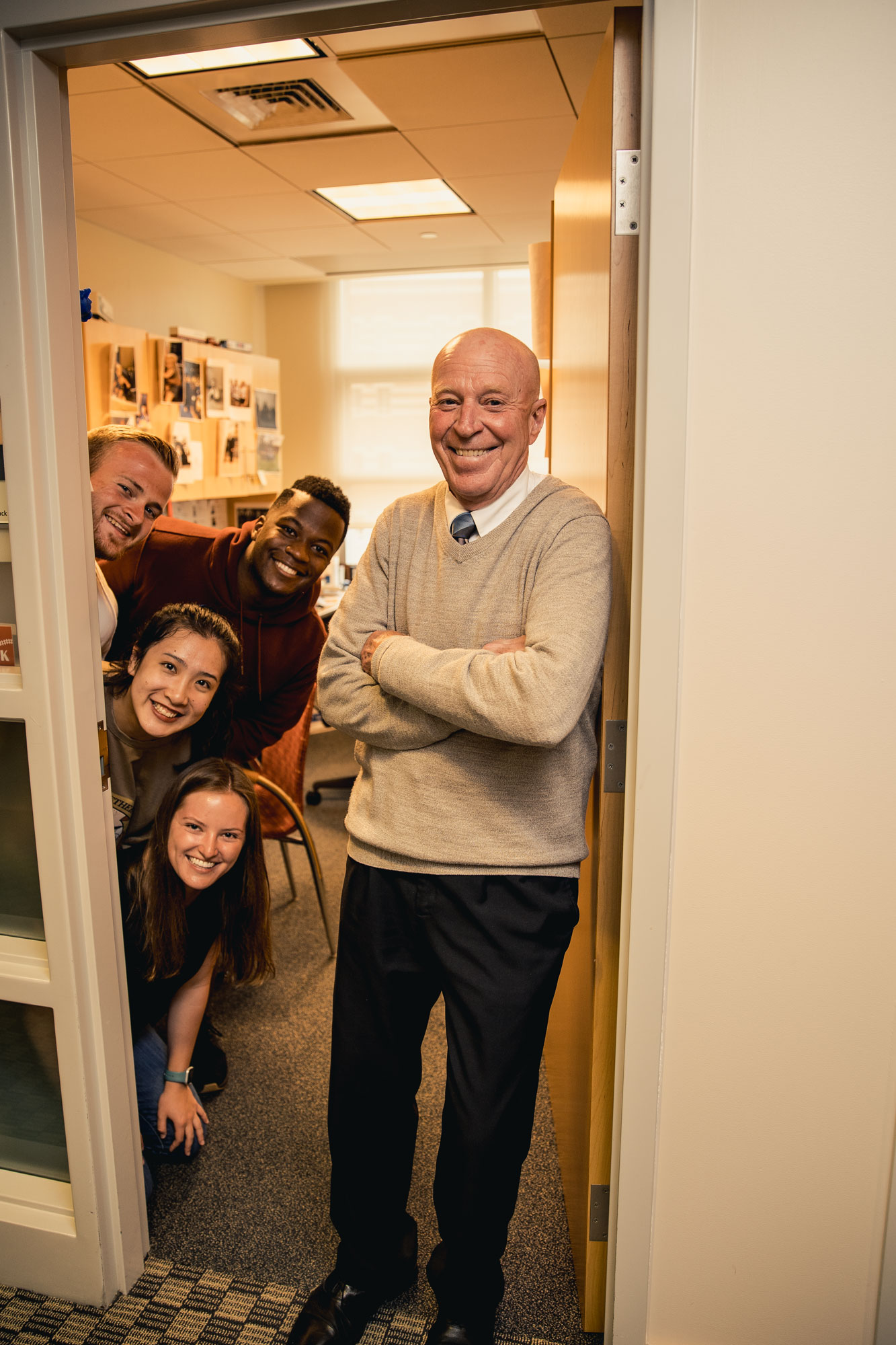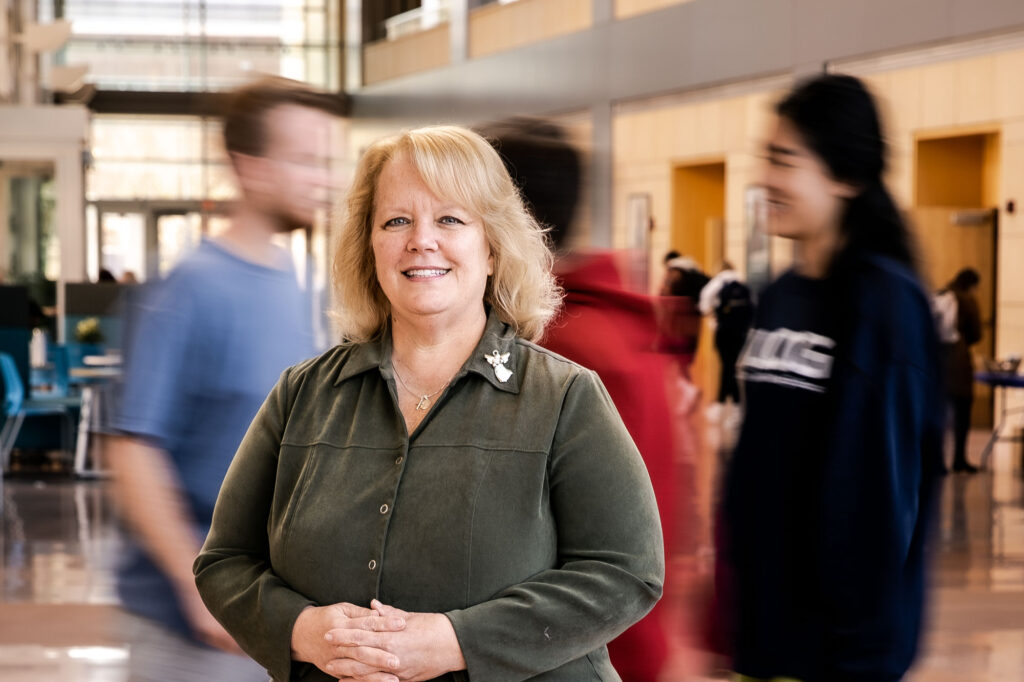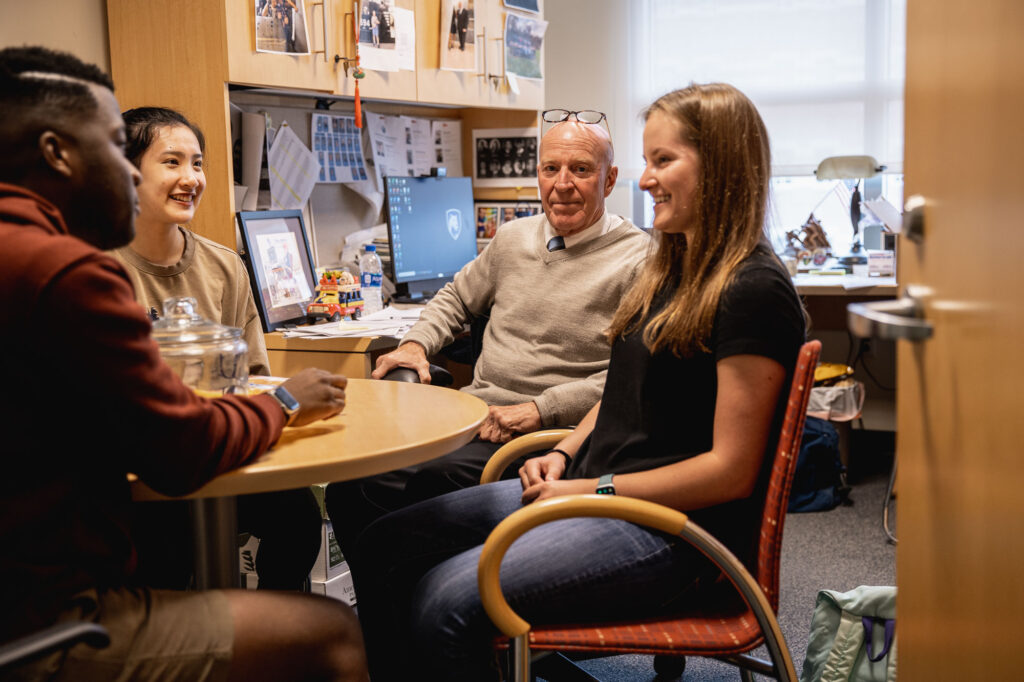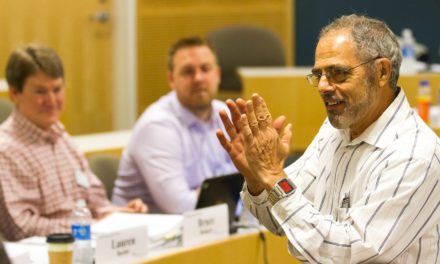SMEAL’S SAPPHIRE LEADERSHIP ACADEMIC PROGRAM KEEPS IMPROVING, EXPANDING ITS IMPACT ON THE NEXT GENERATION OF LEADERS.

Bob Novack, shown here with students (from top) Cam Vinson, Michael Mitole, Chrisly Li, and Emily Irvin, has led the Sapphire Leadership Academic Program at Smeal since 2013. He will retire from that role this year.
During the fall of 2013, three supply chain students in the Penn State Smeal College of Business’s Sapphire Program met with Bob Novack, a program advisor and associate professor.
They weren’t getting anything out of the nine-year-old program, the students told Novack.
“We were essentially just a student-run club trying to prepare Smeal students for the real world,” recalls Kyle Wang, a 2014 graduate and former Sapphire president. “We told Dr. Novack that if Sapphire was going to be part of what attracts students to Smeal, wouldn’t it be interesting if the college adopted the program with dedicated faculty and a targeted curriculum?”
Agreeing, Novack met with Dean Charles Whiteman to tell him, “Either kill it or build it. We can’t bring in more students to a program that’s mostly smoke and mirrors.”
Several days later, Whiteman gave Novack the go-ahead to build it. “Recruiters,” Whiteman says, “felt that Smeal students were academically qualified but were lacking in leadership experiences.”
As a faculty advisor, Novack soon teamed up with Dina Guthoff, who was then director of undergraduate student enhancement programs and is now the Sapphire academic director. Together — with significant donor support — they thoroughly transformed the Sapphire Leadership Academic Program, as it is now known, into a highly structured, four-year academic and professional development business leadership program.
The program is so popular that, this past academic year, a record 700 incoming first-year Smeal students applied to be part of the 2021 cohort of just 50 students — a 7% acceptance rate. Although they are required to maintain a 3.5 GPA, the students’ average GPA is 3.74. Not surprisingly, for the past three years their job placement rate has been 100%.
A review committee of faculty, staff, and Sapphire alumni selects the participants based on accomplishments beyond grades; leadership positions, such as class presidents and sports team captains; community service experiences; recommendation letters; and their written essays.
“We attract the best of the best,” says Guthoff, who advises the students academically and otherwise oversees the extensive programming. “They are high achievers who come in enthusiastic, hungry, and passionate about being in college and making the most of it.”
The fast-track, hands-on program quickly immerses students and tests them on everything from dinner etiquette to emotional intelligence and social responsibility. A specialized, small-class curriculum of six Sapphire courses includes: a first-year business fundamentals seminar that gets Sapphires thinking like today’s business leaders; a hands-on management course launched by Gus Colangelo, a recently retired management and organization professor; a leadership seminar taught by college administrators, including Dean Whiteman and a host of other associate deans; and a senior capstone consulting course that Assistant Teaching Professor David Lenze also teaches to his second-year MBA students.
Besides academics and leadership, there’s also a strong emphasis on community. That includes both community service — this year, Sapphire’s THON branch and its two dancers raised a program record $25,341 — and multiple ways for Sapphire students to bond with each other — from board games and field days to the option of living together in the Business and Society House adjacent to the Business Building.
“Just as Penn Staters beget other Penn Staters, there is a growing network of Sapphires who are either hiring other Sapphires or influencing their hirings through their outstanding job performances.”
Besides classes, Sapphire annually offers more than 100 events that focus on leadership and professional development, ethics and social responsibility, community service and Sapphire involvement; some of these include access to CEOs and other business leaders.
“The programming never stops because we believe professional development never stops,” says Michael Mitole, a rising senior finance major and Sapphire student president. “It gave me the temerity, in 2019, to think my freshmen team could beat out 29 older Smeal teams in a PwC Case Competition, which we did.”
He also quickly formed personal connections via the program’s “Lead and Leadle” mentoring program, in which upper class students mentor younger students.
“My mentor had offers from Goldman Sachs and other great banks, and he really took me under his wing,” he says.
For the second straight summer Mitole, the American-born son of Malawi immigrant CPAs who came to Pittsburgh to earn their MBAs, will intern with the Boston Consulting Group (BCG). He says he ultimately hopes to attend Oxford or Cambridge universities on either a Rhodes or Marshall scholarship, then join a major consulting firm or think tank, such as BCG.
Kayla S. Anthony, a rising junior management major from Lorton, Virginia, talked about the impact the program has had on her personal and academic lives.
“The Sapphire program has become such a large chunk of my life,” she says. “I’ve made so many close friends, including my roommate, and it’s had a huge impact on my professional development.”
She is both the Sapphire communication chair and an engagement manager for the Nittany Lion Consulting Group, where her student team advised the Penn State Gender Equity Center on how to increase its public engagement.

Top photo: Dina Guthoff, academic director, has played a significant role in transforming the Sapphire Leadership Academic Program into a highly structured, four-year business leadership program.
“A lot of our events focus on leadership, such as how to be an ethical leader and managing conflicts. Being able to talk about such things has given me a real advantage,” says Anthony, who is interning with PwC this summer. She said she hopes to combine her interests in business, technology, and the law to become a data privacy lawyer.
Emily Irvin, a graduating supply chain and information systems major with a 3.99 GPA, first met Novack when he offered a semester-long consulting project class at State College Area High School. “He’s been a crazy big influence on me,” she says. “His office is always open. When people can’t find me in the business building, his office is the first place they go.
“Multiple times he’s come to me with opportunities, such as scholarships and internships, and told me, ‘I think you’re qualified for this, and I’ve already started on your recommendation letter.’”
Irvin, the former Sapphire president, interned virtually last year for Dell Technologies and, following her May graduation, will begin a supply chain job at the firm’s Austin, Texas, headquarters. “Dell has been my ultimate goal,” says Irvin. “A long line of Sapphires who I’ve looked up to, usually two each year, have gone there, and they’re waiting for me.”
When she arrives, she also will recognize another familiar face: rising senior Katie Cocco, one of her Sapphire mentees, who will be interning at Dell this summer.
“Just as Penn Staters beget Penn Staters, there is a growing network of Sapphires who are either hiring other Sapphires or influencing their hirings through their outstanding job performances,” says Novack. “The most satisfying thing is to see them grow and go off to have great careers and do good things for the world.”
Guthoff says Novack is the program’s visionary, but he disagrees. “I’m just a bulldozer,” says Novack, who has taught at Penn State Smeal for 35 years. “I paved the way for what the students wanted.”
Wang, the 2014 finance graduate who helped trigger that evolution, is now the managing partner of Valhalla Capital, a blockchain startup accelerator based in San Juan, Puerto Rico. He returns periodically to review new applications.
“The applicants are all involved in a crazy amount of extracurriculars — I joke that everyone seems to be an Eagle Scout — and their essays are really well written,” he says. “And when I see them on campus, they are intelligent and ask sharp questions. It’s amazing how each generation of Sapphires gets smarter and smarter.”





